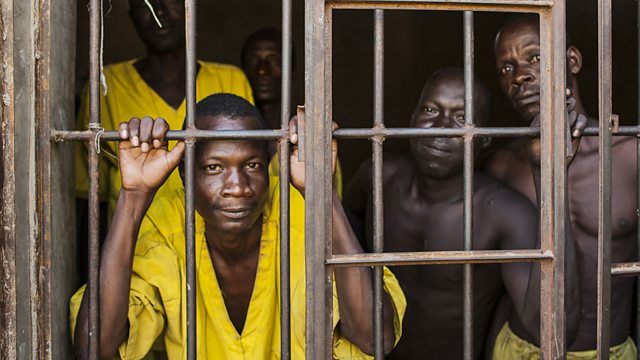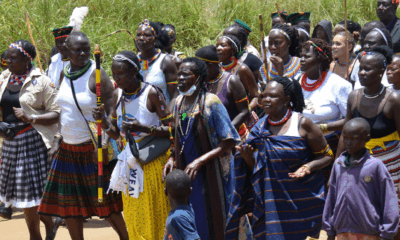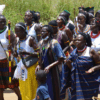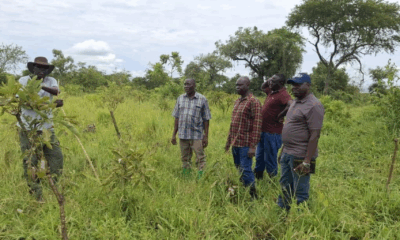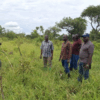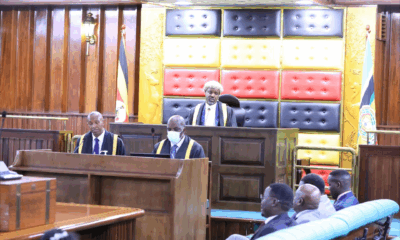Analysis
Uganda Human Rights Commission Exposes Dire Conditions in Eastern Uganda Detention Facilities
A distressing report released by the Uganda Human Rights Commission (UHRC) Soroti Regional Office has cast a harsh spotlight on the grim conditions prevalent in detention facilities across Eastern Uganda. The report, which is a culmination of monitoring and inspection activities conducted during the financial year 2024/2025, covered 76 facilities in 17 districts within the Teso, Bugisu, and Sebei sub-regions, alongside the cities of Mbale and Soroti.
Katakwi district was the sole area not subjected to inspection. The inspected facilities included 17 prisons, 18 central police stations, 26 police stations, 13 police posts, the Mbale remand home, and the Bugema military detention facility. This extensive monitoring fulfils one of the Commission’s constitutional mandates under Article 52 (1) (b) to assess and inspect inmate conditions and provide recommendations.
During a stakeholder dissemination meeting in Soroti City, Josephine Akello, a human rights officer from the Soroti Regional Office, presented findings highlighting significant human rights concerns. Within prisons, major issues identified included severe overcrowding, insufficient staffing, prolonged pre-trial detention, the alarming practice of mixing juvenile offenders with adults, and mothers being incarcerated with their children.
The report also pointed to the problematic transfer of remand prisoners away from their district courts and the presence of old and dilapidated prison structures. Further concerns encompassed inadequate bedding and clothing, poor access to clean and safe water, substandard sanitation and hygiene, excessive workloads for inmates, escapes from lawful custody, protracted waiting times for court hearings, and a critical lack of alternative power sources.
The Commission’s findings indicate that prison populations significantly exceed planned ward capacities, a situation primarily driven by prolonged pre-trial detention, limited physical space, and high crime rates. Akello revealed that some facilities were found to hold twice or even three times their intended capacity, with male inmates disproportionately affected. This pervasive overcrowding severely impacts the health, safety, and dignity of prisoners. Notable examples include Mbale Main Prison (1,452 inmates), Soroti Main (1,385), Bubulo (394), Serere (210), Mutufu (242), Odina (187), Amuria (232), and Kaberamaido (192).
Disturbingly, inmates at Bubulo prison reported sleeping in toilets due to the lack of space. The report also uncovered numerous detainees, both for capital and petty offences, who have been on remand for many years—some for over a decade—without their cases being concluded. This backlog is attributed to factors such as delayed judicial processes, infrequent High Court sessions, irregular court sittings, frequent case adjournments, the absence of State Attorneys in some areas, lack of transport to bring inmates to court, and sluggish police investigations.
Specific instances cited in the report underscore the gravity of the situation. At Mbale Main Prison, 545 inmates had been committed to the High Court, while 79 inmates from Bubulo prison had spent over two years without being committed to the High Court. The longest-serving remand prisoners at Mbale Main date back to 2014 and 2019. Similarly, 56 capital offenders at Soroti Main had not been committed to the High Court, with 22 of them on remand since 2022.
Ngora prison had two inmates on capital offences on remand since 2022 and 2023 without High Court committal, while Kumi had eight, Bukedea one, and Soroti Women seven capital offenders. For petty offences, Kumi had eight, Ngora two, Soroti Women two, and Soroti Main 55 (with one inmate on remand for 1 year and 7 months). Compounding these issues, prisons were found to be critically understaffed; while the ideal staff-prisoner ratio is 1:3, the actual ratio ranged between 1:10 and 1:15, with average staff capacities between 15 and 149 officers.
Further human rights abuses include the lack of food for inmates attending court sessions for long hours, severely impacting individuals with diabetes and ulcers. Skin infections like scabies were prevalent in Mutufu, Serere, and Bubulo due to poor hygiene. Inmates in Serere reported having lice, skin rashes, and swellings, while those at Soroti Main reported urinary tract infections (UTI) and bed bugs. Most prisons also lacked isolation cells for inmates with contagious diseases, though Mbale Main had one, used improvisationally during emergencies.
The Mbale remand home, serving a vast region including Busoga, Teso, Bugisu, Bukedi, Sebei, and Karamoja, currently houses 112 juveniles aged 12-17, despite being designed for only 40 boys and five girls. It also lacks a dedicated van for transporting juveniles to court. In police detention facilities, a significant issue is the absence of appropriate holding areas for female and juvenile suspects, leading to their placement in officers’ offices, while minor offenders are often immediately released.
A shortage of female officers in some facilities compromises the rights of female suspects during arrest. Many police facilities still rely on unhygienic bucket systems for human waste disposal at night. The Commission observed adults detained beyond the constitutional 48-hour limit and children beyond 24 hours, with some suspects held for 3 to 19 days without court appearance, largely due to transport shortages and delayed investigations. Districts like Kalaki, Kapelebyong, and Kween lack resident state attorneys, further exacerbating delays.
Alarmingly, some police stations were found detaining children below the age of criminal responsibility (12 years), with one station holding six out of eight detainees under this age. Other concerns at police stations included dilapidated structures, insufficient transport for officers at the sub-county level, and inadequate food provisions for suspects. Akello stated that these critical issues will be formally addressed during a national engagement organised by the UHRC head office in Kampala. Recommendations from this national discussion are expected to guide improvements in the protection and promotion of detainees’ rights and freedoms across Uganda.
In response to these findings, ACP Ronald Kalali, the regional prisons commander for the Mid-Eastern region, acknowledged the staffing challenges but reported the recent recruitment of over 1,000 warders and wardresses, who are soon to begin training. He also pledged to address the issue of suspected juvenile detention in specific prisons. Kalali, however, noted ongoing challenges in providing food for inmates during long court sessions and admitted that inmates are sometimes overworked beyond the recommended six hours during harvest periods.
Sarah Amunyir, the probation and welfare officer at Mbale remand home, highlighted the difficulties of age verification for juveniles, noting she has had to send away individuals who appeared to be adults despite claiming to be children, facing attacks for her decisions. She also noted the severe understaffing with only three staff members overseeing over 112 juveniles, and despite adequate bedding, there is insufficient sleeping space. Betty Agudo, representing Justice for Children Coordination in the Kumi and Soroti court circuits, emphasised that age verification remains a major hurdle due to the presence of only one police surgeon.
SSP Joseph Otai, the regional prisons commander for the Eastern region, attributed prison overcrowding to population growth, limited cell space, and inactive judicial processes. Amos Oluka Adotu, the senior probation and welfare officer for Soroti district, stressed that child detention should be a last resort to prevent exposure to negative behaviours, advocating for alternative dispute resolution for petty offences and cautioning police against handcuffing juveniles. Bosco Otim, the former regional police commander for the Elgon region, affirmed the report’s accuracy and expressed his desire for these issues to be addressed by supervisors in Kampala.
SSP Gad Murungi, the regional police commander for East Kyoga, noted their region has a workforce of 459 personnel, 40 per cent female, stationed at sub-counties, which will help address staffing shortages. Emmy Geoffrey Sayekwo, the deputy registrar for Soroti High Circuit, acknowledged efforts to reduce overcrowding through plea bargains and additional High Court sessions, urging stakeholders to perform their duties without corruption.
James Small Chemutai, the acting resident city commissioner of Soroti, reiterated the government’s commitment to human rights and pledged to identify and address existing gaps. Paul Eseru, the Soroti District Resident Commissioner, vowed to uphold individual rights. Despite the challenges, positive developments such as facility construction and renovation, improved registration and records, rehabilitation programs, human rights committees in prisons, better health access, elimination of bucket systems, and improved food access were noted.
Comments



